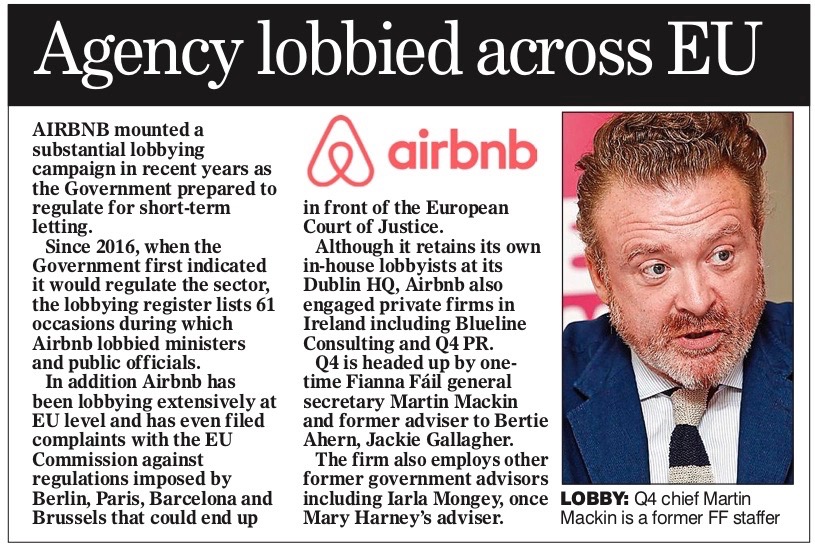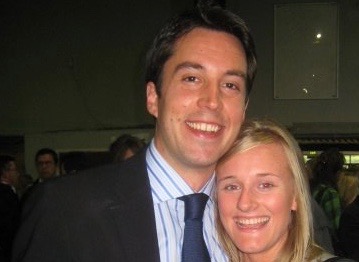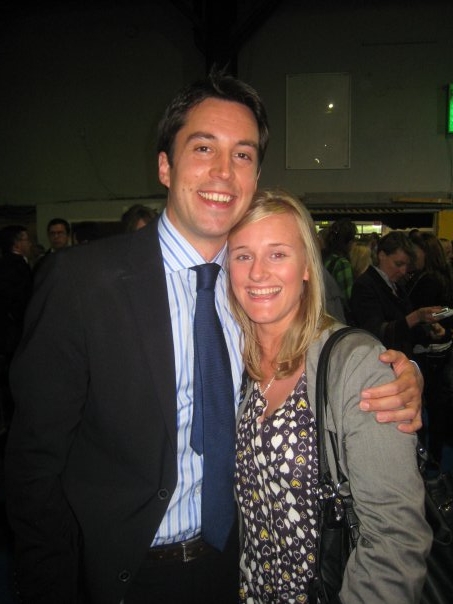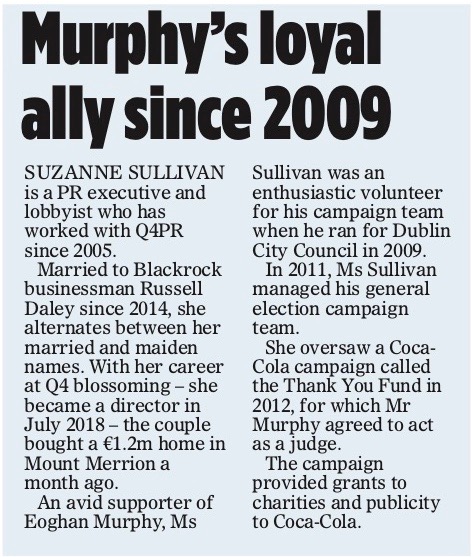By Michael O’Farrell
Investigations Editor – The Irish Mail on Sunday
HOUSING Minister Eoghan Murphy was lobbied by a PR woman who was previously his campaign manager.
But crucially, Ireland’s lobbying laws mean neither the minister nor the lobbyist were required to declare their close relationship on the lobby register.
Q4PR director Suzanne Sullivan was hired by Airbnb to influence the Government’s short-term letting rules in 2018. At the time Airbnb was in the midst of an intensive lobbying campaign over the new regulations that were designed to ease the housing shortage and homelessness.
Ms Sullivan, an employee of Q4PR since 2005, has been a key political ally of Mr Murphy’s since she volunteered with his successful 2009 campaign to become a member of Dublin City Council.
Referred to as the ‘PR Machine’ by Mr Murphy’s campaign team, she subsequently played a key role managing his 2011 general election campaign.
However, a spokesman for the minister yesterday denied that he spoke to Ms Sullivan about Airbnb – and said the short-term letting laws that were introduced prove that the tech company had ‘no influence’ on the legislative changes.
The lobbying register details activities during which Ms Sullivan targeted Mr Murphy and his officials.
According to the register, Ms Sullivan – acting on behalf of Airbnb – telephoned the minister to set up a face-to-face meeting in early 2018.
According to the register, the requested meeting between Ms Sullivan and Mr Murphy did not ultimately take place.
Instead, Ms Sullivan called Mr Murphy’s special adviser, Jack O’Donnell, and succeeded in setting up a meeting with him.
The long-standing political relationship between Mr Murphy and Ms Sullivan will place the Government’s short-term letting regulations under renewed scrutiny.
The regulations, which came into force in July after years in gestation, have been widely criticised as ‘light touch’, unenforceable and not suitably funded.
There is also likely to be further questions about the effectiveness of the lobbying register – a mechanism intended to provide transparency about the activities of the sector.
Unlike other members of Mr Murphy’s election teams, Ms Sullivan makes no mention of her long-standing affiliation with the minister in her public Linkedin profile.
Nor is the association mentioned anywhere on any lobbying returns or on Q4’s website.
But Ms Sullivan was close enough to Mr Murphy to schedule a half-hour meeting with him in July 2017 – three weeks after he became housing minister.
The one-to-one meeting was listed in the minister’s official diary but last night a spokesperson for the minister said the arranged meeting – which predated Q4’s work with Airbnb – also never happened.
Last night Labour senator Kevin Humphreys, who has repeatedly accused the Government of ‘dragging its feet’ to introduce the new regulations, said he had ‘very serious concerns considering the close relationship that Ms Sullivan has with Minister Murphy’.
Mr Humphreys also questioned the length of time it took to introduce the regulations, which said were ‘light touch’ and ultimately unenforceable.
‘The legislation that we eventually saw was difficult to enforce, as has now been proven. It also took an abnormal length of time from when this became a real issue – especially in relation to Dublin – until we saw legislation,’ he said.
‘From the time the short-term lets were presented as a problem for our capital city – and other cities like Galway and Cork and Kilkenny – it took an awful lot of time for the legislation to come through.
‘Even when it did come through we are still seeing delays in relation to funding enforcement. We have no enforcement officers outside Dublin to enforce the short-term lets, even though places like Galway are experiencing a very difficult housing crisis.’

A spokesman for Q4PR said: ‘Suzanne Sullivan is a highly regarded senior consultant at Q4 Public Relations and, in a personal capacity, is a long-standing Fine Gael supporter and party member. She has been a high-profile volunteer on a number of political campaigns over the past 10 years.
‘Q4PR was contracted to provide communications and public affairs consultancy to Airbnb from March 2018 until June 2019. Q4PR is fully compliant with all aspects of the lobbying legislation.’
A spokesman for the minister said: ‘Minister Murphy never met with Airbnb and, despite the company lobbying members of the Oireachtas and encouraging their customers to lobby members of the Joint Oireachtas Committee on Housing, he introduced strict laws that go beyond most other jurisdictions that have legislated in this area.
‘The diary entry some three weeks after Minister Murphy’s appointment was carried over from prior to the minister’s appointment and the meeting never took place.
‘Minister Murphy never met with Airbnb. Requests were made and refused because Airbnb refused to provide the information the minis-ter was looking for around figures of short-term lets in Ireland.
‘At no point did Minister Murphy ever discuss the substance of his proposals to ban short-term letting with Ms Sullivan.
‘The Government’s regulation of short-term letting goes further than what the Joint Oireachtas Committee was recommending and further than the Minister’s own Working Group recommendations on the matter.
‘In fact, it is more radical legislation than many other cities that have legislated for the short- term letting sector. The minister never met with Airbnb and never discussed his proposals with their representatives.
‘It is abundantly clear from what is law today that Airbnb had no influence on the minister’s or the Government’s decision-making process on this matter.
‘The evidence for this is in the far-reaching nature of the reforms which Airbnb vehemently opposed and which is clear from their lobbying of members of the JOC, their public statements on the matter and the manner in which they encouraged customers to lobby politicians on the JOC.
‘All public representatives supported and voted in favour of the legislation implementing these reforms.
‘The only delay in introducing the reforms amounted to four weeks in total and the sole reason for this was to give sufficient time after the legislation passed all stages for public notices to appear.
‘The laws are only in existence four months and it was always envisaged that they would take time to bed down. There are significant resources in place for new enforcement staff which DCC are in the final stages of recruitment.’
The department spokesman did not answer, when asked, how many meetings Ms Sullivan and Mr Murphy have had during his term of office, which began in June 2017.




